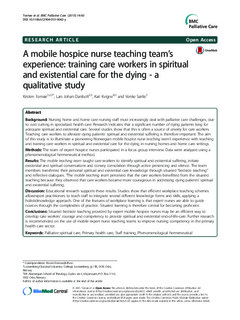A mobile hospice nurse teaching team’s experience: training care workers in spiritual and existential care for the dying - a qualitative study
Journal article, Peer reviewed
Permanent lenke
http://hdl.handle.net/11250/2371179Utgivelsesdato
2015Metadata
Vis full innførselSamlinger
Sammendrag
Background Nursing home and home care nursing staff must increasingly deal with palliative care challenges, due to cost cutting in specialized health care. Research indicates that a significant number of dying patients long for adequate spiritual and existential care. Several studies show that this is often a source of anxiety for care workers. Teaching care workers to alleviate dying patients’ spiritual and existential suffering is therefore important. The aim of this study is to illuminate a pioneering Norwegian mobile hospice nurse teaching team’s experience with teaching and training care workers in spiritual and existential care for the dying in nursing homes and home care settings. Methods The team of expert hospice nurses participated in a focus group interview. Data were analyzed using a phenomenological hermeneutical method. Results The mobile teaching team taught care workers to identify spiritual and existential suffering, initiate existential and spiritual conversations and convey consolation through active presencing and silence. The team members transferred their personal spiritual and existential care knowledge through situated “bedside teaching” and reflective dialogues. “The mobile teaching team perceived that the care workers benefitted from the situated teaching because they observed that care workers became more courageous in addressing dying patients’ spiritual and existential suffering. Discussion Educational research supports these results. Studies show that efficient workplace teaching schemes allowexpert practitioners to teach staff to integrate several different knowledge forms and skills, applying a holisticknowledge approach. One of the features of workplace learning is that expert nurses are able to guide novices through the complexities of practice. Situated learning is therefore central for becoming proficient. Conclusions Situated bedside teaching provided by expert mobile hospice nurses may be an efficient way to develop care workers’ courage and competency to provide spiritual and existential end-of-life-care. Further research is recommended on the use of mobile expert nurse teaching teams to improve nursing competency in the primary health care sector. Keywords: Palliative spiritual care; Primary health care; Staff training; Phenomenological hermeneutical

